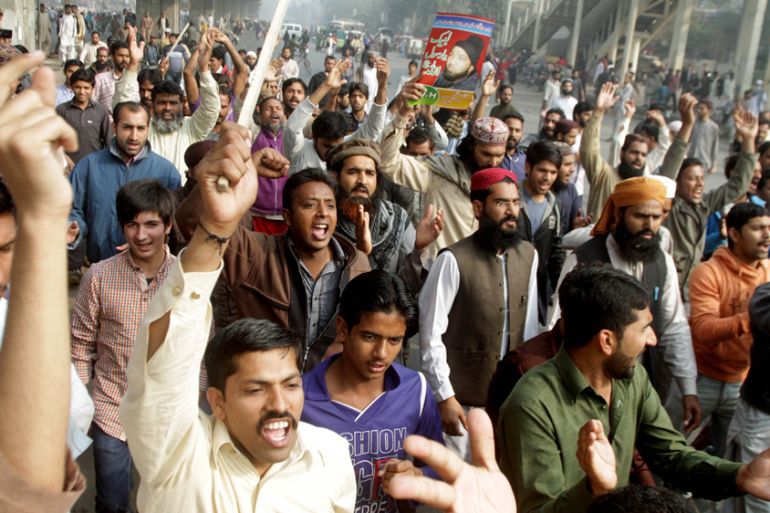The glaring hate of Pakistan’s ignored
Widespread support for Mumtaz Qadri is reflective of the powerful political voice of religious groups in Pakistan.

They gather in the streets of the capital and only the colour of their clothing seems to be different. These men, and they are all men, are all aged between 15 and 50.
They wear the traditional Pakistani shalwar kameez and beards sprout from their faces with an old-fashioned topi, a hat atop their heads. But it is the eyes that really give them away. Each one I meet glares at me with anger and hate.
Keep reading
list of 4 itemsMuslim pupil loses UK court bid over Michaela school prayer rituals ban
Photos: Sikhs celebrate harvest festival of Baisakhi, marking new year
Masses gather for Eid celebrations in India
These men are Pakistan’s ignored. They work the lowest paid jobs, if they have jobs. They spend their time between the madrassas, the religious schools, or their homes.

Not for them the glitz of Pakistani fashion and music. They do not live the lifestyles of the fabulous that advertisers pump out relentlessly on the myriad news channels that dominate the media landscape.
But they do have one thing, one thing that gives them hope. One thing that gives them power, that lifts them out of poverty and allows them a voice. That thing is religion. As they file past me they shout “God is great” and “Mumtaz Qadri is our hero”.
Qadri was executed for killing the outspoken Pakistani politician Salman Taseer because the politician defended a Christian woman accused of blasphemy against the Prophet Mohammed. Qadri, a police officer, was sent to guard the politician. Instead he shot him in cold blood.
One of them gives his name as Mohammed, but I can tell this is not his name. He says to me that he will never allow his prophet to be insulted. In broken Urdu he says: “I will kill anyone who insults my religious beliefs and my beloved prophet.”
You can tell in his eyes that the intent, if not the action, is serious. What Mohammed and his fellow protesters have achieved in the capital is unprecedented.
The ringleaders of the protest have harnessed the anger and energy of these men and built them into a force to push their own agenda.
It is breathtaking in its simplicity and effectiveness. By building a network across mosques and schools, the hardline religious groups have bought themselves a powerful political voice for their demands to bring Pakistan under their influence and enforce hardline religious rule.
It is unlikely that the government will accept their demands, which include execution of anyone accused of blasphemy and turning Qadri into an official national martyr. But that voice, those demands have been heard across the nation.
In the capital I am glared at by the men. I have seen that look and that hatred in men’s eyes before. As a teenager in the UK I was caught up in a rally held by extreme right-wing nationalists.
They also had a uniform. Bald heads and green bomber jackets identified them. As I walked by I saw their eyes twisted with hate. Once again it was the leaders of those groups that had built them into a movement. Anger is a powerful tool for those that can manipulate it.
Whether it is Europe or South Asia, these groups are used as tools. I say to Mohammmed that his leaders have lied to him about religion and his passion for his prophet, honourable though it is, is being used by his leaders for politics, not religion. His answer does not surprise me.
“We are a nation of sinners. Our leaders will rise and we will kill those who blaspheme and insult our prophet. I am ready to die for my cause. Are you?”
Follow Imran Khan on Twitter: @ajimran